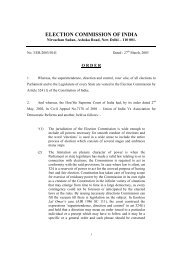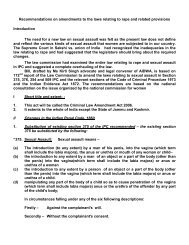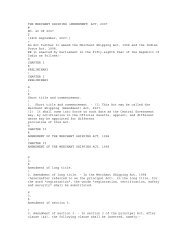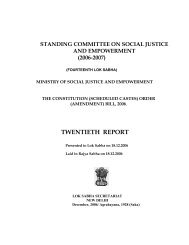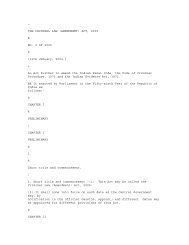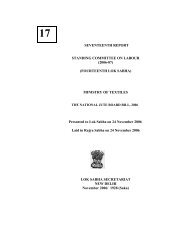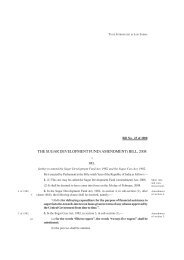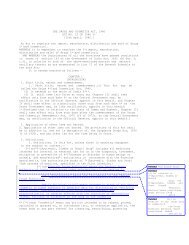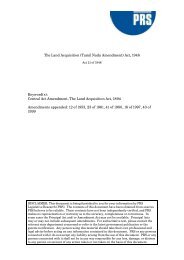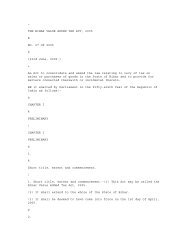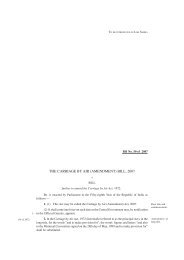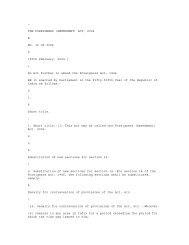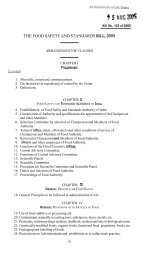Report of the Tiger Task Force - PRS
Report of the Tiger Task Force - PRS
Report of the Tiger Task Force - PRS
Create successful ePaper yourself
Turn your PDF publications into a flip-book with our unique Google optimized e-Paper software.
■ JOINING THE DOTS TIGER TASK FORCE REPORTdeclared its intention to declare an area a nationalpark or sanctuary and before <strong>the</strong> rights <strong>of</strong> affectedpeople are finally settled, “<strong>the</strong> state government shallmake alternative arrangements required for makingavailable fuel, fodder and o<strong>the</strong>r forest produce to <strong>the</strong>persons affected, in terms <strong>of</strong> <strong>the</strong>ir rights as per <strong>the</strong>government records”.In o<strong>the</strong>r words, <strong>the</strong> ground reality is that <strong>the</strong>government has to provide for <strong>the</strong> “needs” <strong>of</strong> peopleif it declares any area as a sanctuary or national parkor any o<strong>the</strong>r protected reserve — till <strong>the</strong> rights havebeen compensated. At <strong>the</strong> same time, <strong>the</strong> groundreality is that it does not. So, a situation gets createdin which a double negligence occurs: on <strong>the</strong> onehand, rights that ought to be settled by law are notsettled; instead <strong>the</strong>y keep getting expunged.Institutions whose intention is to protect <strong>the</strong>reserves — <strong>the</strong> Union ministry <strong>of</strong> environment andforests, or <strong>the</strong> Central Empowered Committee —seem to have done nothing to ensure that, whenrights are taken away by <strong>the</strong>ir fiat, alternatives areprovided.There seems to now exist two proceduralregimes, and institutions seem to pick one or <strong>the</strong>o<strong>the</strong>r, not tackling <strong>the</strong> inherited ambiguities causedby <strong>the</strong> original defect in <strong>the</strong> law:● Rights are settled, <strong>the</strong> sanctuary is notified andall prohibitions come into force;● Rights are not settled, but <strong>the</strong> sanctuary ornational park exists; so, all prohibitions comeinto force but none <strong>of</strong> <strong>the</strong> safeguards.Ei<strong>the</strong>r way, people are <strong>the</strong> losers. Ei<strong>the</strong>r way,conservation is jeopardised.What is being done?In November 4, 2004, <strong>the</strong> Central EmpoweredCommittee filed an interim report for <strong>the</strong>clarification <strong>of</strong> <strong>the</strong> Supreme Court order <strong>of</strong> February14, 2000 (in which it had banned <strong>the</strong> removal <strong>of</strong> deadtrees etc from national parks and sanctuaries). In thisreport, <strong>the</strong> committee recommended <strong>the</strong> apex Courtclarify <strong>the</strong> following:● What is allowed for <strong>the</strong> better management <strong>of</strong>parks — like firelines, maintenance <strong>of</strong> fairwea<strong>the</strong>r roads, habitat improvement?●●What is prohibited in a protected area?Can exemption be given for small public utilityprojects <strong>of</strong> non-commercial nature?The key recommendation that concerns <strong>the</strong>rights <strong>of</strong> people is that <strong>the</strong> committee includesremoval <strong>of</strong> bamboo or grasses in <strong>the</strong> list <strong>of</strong>prohibitions. Without provision <strong>of</strong> alternatives, thisimpinges on people’s fodder requirements. Equally,it is silent on <strong>the</strong> extraction <strong>of</strong> minor forest produceby people.A particularly vexed questionThe law, as interpreted by conservationists, providesthat people living in and around <strong>the</strong> protected areacan collect and remove forest produce, but only tomeet bona fide needs. The problem is that no one hasever defined what “bona fide needs” mean. In o<strong>the</strong>rwords, if poor tribals in <strong>the</strong> Nagarhole national parkin Karnataka collect honey and sell it for <strong>the</strong>irsubsistence needs, would this constitute a “bonafide” need?This issue was taken up by <strong>the</strong> deputyconservator <strong>of</strong> forests <strong>of</strong> <strong>the</strong> Chamarajanagar range inKarnataka — where <strong>the</strong> Bilirangan temple sanctuaryis located — with his superior <strong>of</strong>ficer, in response to<strong>the</strong> order banning collection <strong>of</strong> minor forest produceby Soliga tribal cooperative societies existing <strong>the</strong>re.The matter, he said, would have been very simple tointerpret if <strong>the</strong> definition <strong>of</strong> “commercial collection”and “personal bona fide use” was defined in <strong>the</strong>Wildlife (Protection) Act, 1972 or <strong>the</strong> rules. Theissues, as he elaborated, are:●Soliga are a forest tribe, who migrated fromNilgiri centuries ago and settled with <strong>the</strong>forests. They were allowed to practice shiftingcultivation in lieu <strong>of</strong> which <strong>the</strong>y were engaged aslabour in various forestry operations. As a result,<strong>the</strong>y do not own land. Collection <strong>of</strong> minor forestproduce for <strong>the</strong>ir cooperative society is <strong>the</strong>ir onlysource <strong>of</strong> income. In o<strong>the</strong>r words, says <strong>the</strong>deputy conservator, for <strong>the</strong> Soliga this collectionserves subsistence needs only.● Commercial exploitation <strong>the</strong>n could beunderstood, he says, in terms <strong>of</strong> <strong>the</strong> quantity <strong>of</strong>produce collected per ha <strong>of</strong> forests. In this case,can collection <strong>of</strong> 10 kg <strong>of</strong> gooseberry or 442 gms<strong>of</strong> honey per ha be termed as commercial?Moreover, banning <strong>the</strong> collection <strong>of</strong> minor forestproduce will destroy <strong>the</strong> relationship that hasdeveloped between <strong>the</strong> Soliga and forests andsustainable extraction <strong>of</strong> <strong>the</strong>se resources.In addition, he admits, <strong>the</strong> ban is unlikely to beeffective. The first difficulty will be in finding whichSoliga is collecting, or has collected, minor forestproduce for <strong>the</strong> purpose <strong>of</strong> trade. If a Soliga is foundwith 10 kg <strong>of</strong> gooseberry or five kg <strong>of</strong> honey, can it besaid what use it is for, personal or commercial? Infact where <strong>the</strong>re has been a ban, <strong>the</strong> experiencehas been that extraction continues, without anysafeguards. 10 But <strong>the</strong> ban in <strong>the</strong> sanctuary continues.Extraction continues, but illegally, in a moreunsustainable fashion. Moreover, it inevitably leadsto more harassment <strong>of</strong> tribals and corruption.The problem is that <strong>the</strong>se provisions — used,interpreted and misinterpreted, with good intentions— are leading to tremendous harassment <strong>of</strong> people.106 The way ahead



